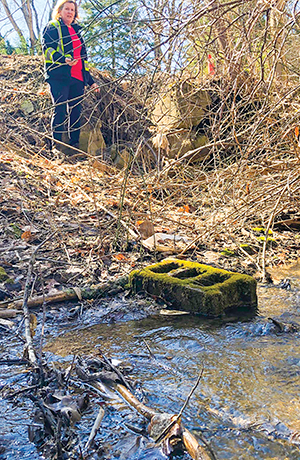Ten-year action plan to guide preservation and restoration of Niagara’s last spring-fed coldwater stream
“Twelve Mile Creek is in real trouble.” These are the words of Dennis Edell, President of the Niagara Chapter of Trout Unlimited Canada (TUC). His organization has been at the forefront of efforts to make the stream’s dire situation known to landowners in the watershed, the general public, and to politicians and municipal staff along the waterway.
The Niagara Chapter has hosted information sessions to bring attention to the plight of the creek and to suggest solutions. A “Healthy Twelve Mile Creek” landowner meeting in November of last year was attended by some 120 people; a “stakeholder meeting” in September drew 45 planners, councillors and mayors; and most recently a workshop on Low Impact Development and Green Infrastructure had some 120 participants from across the Region as well as across Canada.
Now the Niagara Chapter has launched a Ten-Year Action Plan for the Twelve Mile Creek watershed. While the Region has taken responsibility for a Niagara-wide Water Resource Systems Plan, the unique nature of the Twelve, as the only spring-fed coldwater system in Niagara, requires its own “sub-watershed” plan, according to Edell.
Partnering with the Niagara Peninsula Conservation Authority (NPCA), the Niagara Chapter has retained the services of Jocelyn Baker to research and write the Action Plan. Baker is a conservation professional with 25 years’ experience, a project manager, and part-time professor in Niagara College’s Ecosystem Restoration Program. Baker calls the upper Twelve Mile Creek “one of the most unique watersheds in southern Ontario,” thanks to the continuous supply of groundwater supplied by the Fonthill Kame.

“Even in the extreme hot days of summer, the creek has a constant flow of cool, fresh water,” says Baker. “What this means from a biological perspective is the creek supports species not found anywhere else in Niagara.”
However, she sees the creek deteriorating due to increased storm frequency and intensity causing flooding that is reaching disastrous proportions.
“Since our human-made infrastructures —buildings, roads, parking lots—are not permeable, water will quickly ‘runoff’ to the nearest low point. In urban settings such as Fonthill, that runoff flows to storm drains, and those drains directly discharge into upper Twelve Mile Creek.”
Each average-size home, she says, generates approximately 2,000 litres of runoff during one typical storm event. That runoff carries debris, sediment and poisons like salt covering the spawning and nesting beds of the organisms that live in the creek.
“Unfortunately, because of our collective actions, we are losing the very attributes that make our Twelve Mile Creek so special.”
Dennis Edell adds, “A walk along Twelve Mile Creek downstream of Fonthill and into Short Hills Provincial Park quickly shows erosion and sedimentation, indicating a disaster in the making. Not surprisingly it is population growth and climate change that are to blame.”
To develop an Action Plan to mitigate the damage and prevent further deterioration, Baker intends to contact people from every aspect of the watershed’s reach: politicians, municipal staff, landowners, developers, NGOs, and interested citizens. She has already begun the process with mailed out surveys to a preliminary group, but her ambition is to reach everyone who might have an interest in or opinion about the Twelve in order to reflect all points of view in the Action Plan. She can be reached through the TUC Niagara website.
Says Edell, “The success of the Action Plan will depend on the willingness of the stakeholders adjoining the watershed: Pelham, Thorold, St. Catharines, the Region, landowners, and developers to adopt new stormwater management practices.”
Speaking for the NPCA, Senior Manager of Integrated Planning, Geoff Verkade, says that “the Action Plan will build upon the legacy of previous Twelve Mile Creek Watershed strategies and plans by addressing outstanding action items, and identifying additional priorities based on current watershed conditions and environmental issues. For instance, increasing erosion is plaguing the watershed due to its disturbed water balance that is altering stream flow and structure, and warming water temperatures.”
Verkade is enthusiastic about the Conservation Authority’s partnership with the volunteer group.
“With community-driven watershed resilience as the goal,” he says, “the NPCA is proud to stand with the TUC Niagara Chapter as they recognize communication and coordination are key. Collaboration will help the community of watershed stakeholders implement solutions such as extensive ecological restoration, and recommendations for better development practices and associated policies within this precious watershed, through a sense of shared responsibility.”
Dennis Edell concurs. “We’re hoping that with the help of the NPCA, the Niagara Chapter of TUC can be the catalyst for change needed to restore this unique watershed."
At 7 PM on March 30 via Zoom, the Niagara Chapter of Trout Unlimited Canada will host a short presentation on "The Hard Life of Brook Trout in Twelve Mile Creek," followed by a discussion on what needs to be done to restore the Brook Trout population in Niagara's most significant watershed. Anyone living in or around the Twelve Mile Creek watershed has an opportunity to understand what is impacting it and to provide input into the ten-year plan to restore the health of the watershed.
To register for this public information session go to thevoiceofpelham.ca/twelve-mile-creek or to Niagara Chapter TUC’s Facebook page.


